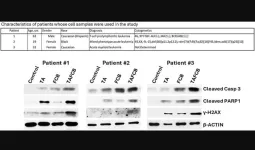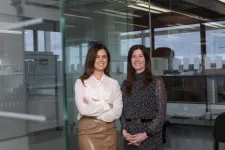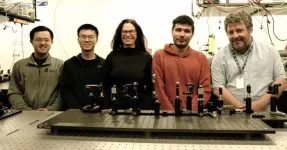(Press-News.org) Research that involves implanting devices into the brains of human volunteers creates a special moral obligation that extends beyond the trial period—an obligation that researchers, device manufacturers, and funders owe to the volunteers. This is the conclusion of two new essays in the Hastings Center Report that launch a series on the ethical and social issues raised by brain research.
The “Neuroscience and Society” series is supported by the Dana Foundation and will be published in open-access format online over the next three years.
The series seeks to promote deliberative public engagement about neuroscience, writes Hastings Center senior research scholar Gregory E. Kaebnick, who leads the development of the series, in “Neuroscience and Society: Supporting and Unsettling Public Engagement,” the introductory essay. “The ultimate goal of the Neuroscience and Society series is to contribute to a vitally important but somewhat uncertain political project often called ‘alignment.’ The guiding thought in that project is that science should align with the public’s values; it should take society in a direction that’s good for society, as judged by society.”
Following the introduction, two essays discuss post-trial ethical obligations raised by studies with cutting-edge neural devices that have a range of potential benefits, such as deep brain stimulation to alleviate psychiatric conditions and brain-computer interfaces to aid communication.
Brain Pioneers and Moral Entanglement: An Argument for Post-trial Responsibilities in Neural-Device Trials
Sara Goering, Andrew I. Brown, and Eran Klein
Human participants in neural-device trials are “brain pioneers,” entrusting researchers with access to their brains. For many of these researchers, what should happen at the end of the study is a troubling question without a clear answer. “Researchers and funders of neural-device trials owe something to participants that, we insist, exceeds the usual benefits of participating,” write the authors. In many cases, “it includes ensuring participants’ continued access to neural devices.”
Identity Theft, Deep Brain Stimulation, and the Primacy of Post-trial Obligations
Joseph J. Fins, Amanda R. Merner, Megan S. Wright, and Gabriel Lázaro-Muñoz
“When neuroethicists write about deep brain stimulation (DBS) via implanted neural devices, they sometimes resort to science fiction hyperbole—imagining parables of cyborgs whose identities are hijacked by the technology,” the essay begins. “This is because with the implantation of such technology comes the threat of a loss of personal identity, that sense of self that is felt as unique to a person.” But findings from two deep brain stimulation trials for traumatic brain injury and obsessive-compulsive disorder reveal that injury and illness rob individuals of personal identity and that neuromodulation can restore it. “The early success of these interventions makes a compelling case for continued post-trial access to these technologies.”
The series is developed with support from Hastings Center senior research scholar Erik Parens. and the guidance of a steering committee of six scholars:
Jennifer Chandler, University of Ottawa
Winston Chiong, University of California San Francisco
Joseph J. Fins, Weill Cornell Medical School
Sara Goering, University of Washington
Jonathan D. Moreno, University of Pennsylvania
Oliver Rollins, University of Washington
For more information, contact:
Susan Gilbert
Director of Communications
The Hastings Center
gilberts@thehastingscenter.org
845-424-4040 x244
END
Neuroscience and Society Series: aligning science with the public’s values
What is owed the “brain pioneers?” What is good for society?
2024-03-25
ELSE PRESS RELEASES FROM THIS DATE:
Friend or foe: A closer look at the role of health care algorithms in racial and ethnic disparities
2024-03-25
PHILADELPHIA -- For years, it was harder for Black patients to secure a coveted spot on the national kidney transplant waitlist because a clinical algorithm was making Black patients appear healthier than they were. After a Penn Medicine researcher exposed the problem in 2019—and showed how it exacerbated racial disparities in kidney disease—a national taskforce recommended removing race from the algorithm’s scoring, a move that has quickly been adopted throughout the country in an effort to reduce ...
ABT199/Venetoclax synergism with thiotepa in acute myeloid leukemia (AML) cells
2024-03-25
“[...] the combination of ABT199/venetoclax and Thio enhances the cytotoxicity of (Flu+Clad+Bu) in AML cell lines and leukemia patient-derived cell samples.”
BUFFALO, NY- March 25, 2024 – A new research paper was published in Oncotarget's Volume 15 on March 14, 2024, entitled, “ABT199/venetoclax synergism with thiotepa enhances the cytotoxicity of fludarabine, cladribine and busulfan in AML cells.”
ABT199/venetoclax, an inhibitor of the pro-survival BCL-2 protein, has improved AML treatment. Its efficacy in hematopoietic ...
More exposure to artificial, bright, outdoor nighttime light linked to higher stroke risk
2024-03-25
Research Highlights:
A large study of residents in Ningbo, China, a major city of more than 8.2 million residents, found that exposure to more artificial, outdoor, nighttime light was associated with a higher risk of conditions that affect brain health.
Excessive exposure to air pollution and artificial, bright light at night were both independently linked to a higher risk of developing cerebrovascular disease and having a stroke.
Embargoed until 1 p.m. CT/2 p.m. ET, Monday, March 25, 2024
DALLAS, March 25, 2024 — People continuously ...
AACR: Progress treating pancreatic cancer, immunotherapy for head and neck cancers, potential biomarker for aggressive neuroendocrine carcinomas and more
2024-03-25
Investigators from the UCLA Health Jonsson Comprehensive Cancer Center will discuss the latest breakthroughs and cutting-edge science at the annual meeting of the American Association for Cancer Research (AACR), which attracts more than 20,000 oncology professionals from around the world.
The annual meeting will feature more than 40 regular, late-breaking and clinical trial abstracts from UCLA physicians and scientists, who will present their latest work in key areas of translational and basic scientific ...
Insights from patient who cleared hepatitis C could lead to vaccine
2024-03-25
ITHACA, N.Y. -- By studying individuals who spontaneously clear hepatitis C infections, a team of researchers has identified viable vaccine targets for a disease that infects 70 million worldwide with case numbers increasing every year.
It turns out that a quarter of people who become infected with the hepatitis C virus clear the infection on their own without treatment, while the remaining three-quarters of people develop chronic infections that can last for years. The blood-borne disease – which causes liver cirrhosis, liver ...
Uncovering the mystery of Dorset’s Cerne Giant
2024-03-25
For centuries, the Cerne Giant, a figure carved into a hillside in Dorset depicting a nude man carrying a club and stretching some 180 feet high, has fascinated locals and visitors to the area. The history of the giant, however, and in particular, its age, has long been a mystery. A new paper in Speculum: A Journal of Medieval Studies proposes that the Cerne Giant can in fact be dated to the early Middle Ages, and, as a result, its cultural context and significance more clearly understood.
“The Cerne Giant in its Early Medieval Context,” by authors Thomas Morcom and Helen Gittos, acknowledges that previous attempts to date the giant placed ...
RCSI research identifies promising drug combination for multiple myeloma treatment
2024-03-25
25 March 2024: RCSI research has found that venetoclax, a medication currently approved for leukaemia, has benefits for patients with multiple myeloma when used in combination with another drug. This discovery offers a new avenue of treatment options for the currently incurable disease.
Multiple myeloma (MM) is a type of blood cancer that is newly diagnosed in around 400 people in Ireland each year. Despite treatment advances in recent years, it remains incurable. The search for innovative treatment strategies is crucial, particularly for patients whose cancer is resistant to standard care.
In the new study published in Haematologica, researchers at the RCSI Department of ...
Confusing assistance requirements contribute to food insecurity among college students
2024-03-25
Philadelphia, March 25, 2024 – Food insecurity among college students is associated with negative physical and mental health and lower academic performance and graduation rates. A recent research study in the Journal of Nutrition Education and Behavior, published by Elsevier, investigates why over half of college students eligible for the Supplemental Nutrition Assistance Program (SNAP)—the nation’s largest food assistance program—do not apply.
Lead study author Suzanna M. Martinez, PhD, MS, Department of Epidemiology and Biostatistics, University of California San Francisco, explained, “In California, ...
Pushing back the limits of optical imaging by processing trillions of frames per second
2024-03-25
Professor Jinyang Liang’s team is advancing in imaging speed with a new ultrafast camera system.
Pushing for a higher speed isn’t just for athletes. Researchers, too, can achieve such feats with their discoveries. This is the case for Jinyang Liang, Professor at the Institut national de la recherche scientifique (INRS), and his team, whose research results have recently been published in Nature Communications.
The group based at INRS’ Énergie Matériaux Télécommunications Research Centre has developed a new ultrafast camera system that can capture up to 156.3 trillion ...
Patient recovery after surgery for esophageal cancer isn’t influenced by using standard or keyhole incisions
2024-03-25
New research has found no evidence of a difference between recovery time and complications when comparing standard and keyhole surgical incisions for the treatment of oesophageal cancer (cancer of the gullet). The study, led by the University of Bristol Medical School and published in the British Journal of Surgery, showed surgeons treating patients with oesophageal cancer do not need to change their practice if they have a strong preference for either procedure type.
Oesophageal cancer is the tenth most common cancer globally. It causes one in 18 cancer-related deaths. ...
LAST 30 PRESS RELEASES:
Scientists show how to predict world’s deadly scorpion hotspots
ASU researchers to lead AAAS panel on water insecurity in the United States
ASU professor Anne Stone to present at AAAS Conference in Phoenix on ancient origins of modern disease
Proposals for exploring viruses and skin as the next experimental quantum frontiers share US$30,000 science award
ASU researchers showcase scalable tech solutions for older adults living alone with cognitive decline at AAAS 2026
Scientists identify smooth regional trends in fruit fly survival strategies
Antipathy toward snakes? Your parents likely talked you into that at an early age
Sylvester Cancer Tip Sheet for Feb. 2026
Online exposure to medical misinformation concentrated among older adults
Telehealth improves access to genetic services for adult survivors of childhood cancers
Outdated mortality benchmarks risk missing early signs of famine and delay recognizing mass starvation
Newly discovered bacterium converts carbon dioxide into chemicals using electricity
Flipping and reversing mini-proteins could improve disease treatment
Scientists reveal major hidden source of atmospheric nitrogen pollution in fragile lake basin
Biochar emerges as a powerful tool for soil carbon neutrality and climate mitigation
Tiny cell messengers show big promise for safer protein and gene delivery
AMS releases statement regarding the decision to rescind EPA’s 2009 Endangerment Finding
Parents’ alcohol and drug use influences their children’s consumption, research shows
Modular assembly of chiral nitrogen-bridged rings achieved by palladium-catalyzed diastereoselective and enantioselective cascade cyclization reactions
Promoting civic engagement
AMS Science Preview: Hurricane slowdown, school snow days
Deforestation in the Amazon raises the surface temperature by 3 °C during the dry season
Model more accurately maps the impact of frost on corn crops
How did humans develop sharp vision? Lab-grown retinas show likely answer
Sour grapes? Taste, experience of sour foods depends on individual consumer
At AAAS, professor Krystal Tsosie argues the future of science must be Indigenous-led
From the lab to the living room: Decoding Parkinson’s patients movements in the real world
Research advances in porous materials, as highlighted in the 2025 Nobel Prize in Chemistry
Sally C. Morton, executive vice president of ASU Knowledge Enterprise, presents a bold and practical framework for moving research from discovery to real-world impact
Biochemical parameters in patients with diabetic nephropathy versus individuals with diabetes alone, non-diabetic nephropathy, and healthy controls
[Press-News.org] Neuroscience and Society Series: aligning science with the public’s valuesWhat is owed the “brain pioneers?” What is good for society?


